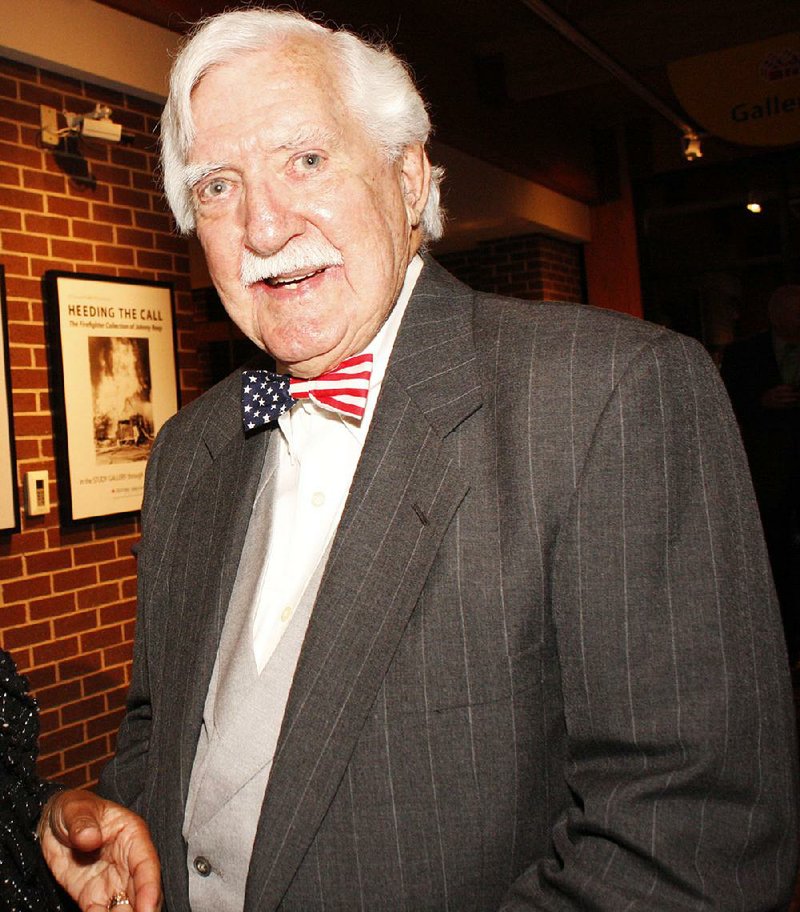Parker Westbrook made himself as indispensable to this state as its name, which he spent decades defending, and even spelling properly. For more than a quarter of a century beginning in 1948, he served on the congressional staffs of various members of the state's delegation--at least four by our count--and became as deeply knowledgeable as any of the leaders he served--or maybe served him.
The ultimate Washington insider, he became the father of historic preservation in this state, moved by a deep love for all things Arkansan/Arkie/Arkansawyer. To quote Missy McSwain, director of the Arkansas Historic Preservation Program: "He loved Arkansas architecture, from the simplest vernacular structure to the grandest state house."
Parker Westbrook was more, much more, than a history buff. He was a combination aide-de-camp, an inexhaustible resource whose institutional memory was longer in many cases than the institutions he served, and, to quote Vanessa McKuin of Preserve Arkansas, "kind of the father of preservation in Arkansas." A man of many parts, he excelled at them all, and was not shy about mastering even more.
Bill Worthen, director of the Historic Arkansas Museum, no slouch at preserving this state's heritage himself, joined in the chorus of praise and wonder for Mr. Westbrook's lifetime of accomplishments. Parker Westbrook's contributions to this state's history scarcely ended with his death Nov. 19 at 89; they will continue as long as people remember his name and Arkansas's. And continue to consult his works of Arkansas history and memorabilia.
Or as Skip Rutherford of the Clinton School of Public Service put it, "When it came to Arkansas history, before there was Google, there was Parker Westbrook. He was a primary source for Arkansas history and Arkansas politics. He was just a walking encyclopedia. Not only did he know about Arkansas history and preservation, he practiced it." And he himself made a lot of it.
Parker Westbrook cared about more than history; perhaps his most endearing trait was his love of language and recognition of how important linguistic differences can be. He wasn't about to dismiss language as just some kind of esoteric detail; he understood the essential role language plays in our understanding of the world, and the world's understanding of us.
There are those who don't see much point in arguing the differences of long-ago disputations between saducees and pharisees, either, but the sensitive understand that every jot and tittle can be of the essence. Like the difference between, say, those who know the proper possessive of Arkansas and those who dismiss it as unimportant. It isn't. It can be the key to understanding so much else. Parker Westbrook never underestimated the importance of where an apostrophe-s belongs and where it doesn't. And did his best to preserve that distinction, influencing and educating so many of us.
To quote Steve Barnes' fine summation of this dispute in the New York Times years ago:
Bowing to a native son's passion for proper punctuation and etymological exactitude, the General Assembly has put the English-speaking world on notice: the possessive case of "Arkansas" requires an " 's."
As in, Arkansas's many wonders.
Please, not Arkansas'.
"It's esoteric, I agree," said one of those wonders, Parker Westbrook, "but that doesn't mean it isn't important."
Indeed, a resolution passed by the [state] Senate requires that spelling in all official documents. The measure, written by Mr. Westbrook, was approved by the House [in 2007]. . . .
Although not every manual of style agrees with the resolution, which does not specify criminal sanctions for failure to comply, the silent second "s" in Arkansas demands an apostrophe and a third "s" to form the possessive, Mr. Westbrook insisted, lest precision count for nothing. (For the record, the style manual at the New York Times agrees with Mr. Westbrook.)
Had the State Legislature not decreed in 1881 that the name "Arkansas" would end with a silent 's,' there would be no cause for concern, he said.
"This is not an apostrophe battle," he added. "It's a war to recognize the definition of the word 'silent.' "
There was some silent rolling of eyes amid the ayes, but no legislator dared seriously challenge the research or the resolve of Mr. Westbrook. Since 1949, he has been an aide to a governor, two United States senators and two congressmen. They included Representative Boyd A. Tackett, whose grandson, State Representative Steven P. Harrelson, Democrat of Texarkana, sponsored the resolution.
"As much as anything it's a tribute to Parker," Mr. Harrelson said with a chuckle, citing Mr. Westbrook's dedication to historic preservation.
Thank you, Parker Westbrook, and not just for a linguistic nicety, but for teaching all of us what's important.
Paul Greenberg is the Pulitzer Prize-winning editorial writer and columnist for the Arkansas Democrat-Gazette.
Editorial on 11/29/2015
